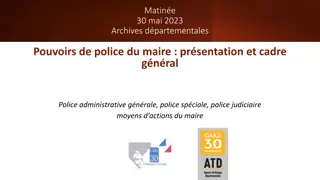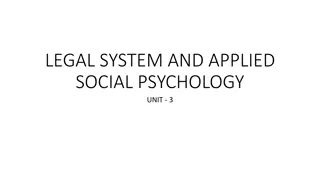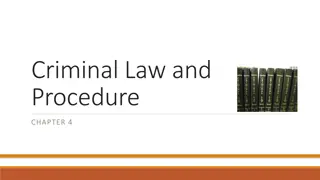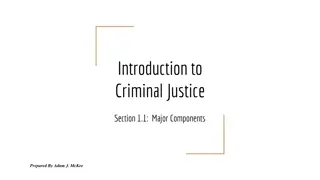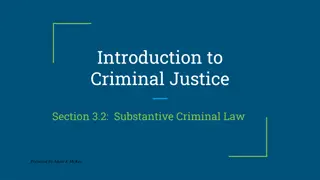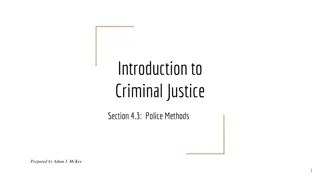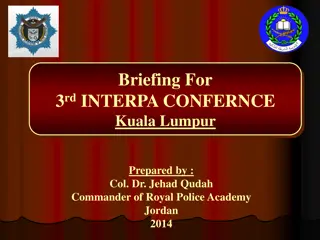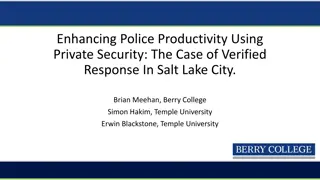Role of Police in Criminal Law Administration
The primary responsibility of the police is to protect the life, liberty, and property of citizens, maintaining law and order, investigating offenses, and safeguarding human rights. Essential features of a First Information Report (FIR) include being timely, accurate, related to a cognizable offense, made to the officer in charge of a police station, in writing and signed by the informant. Additional features emphasize the importance of credible information for FIR registration. Delay in FIR registration can raise suspicions of fabrication if not properly explained.
Download Presentation

Please find below an Image/Link to download the presentation.
The content on the website is provided AS IS for your information and personal use only. It may not be sold, licensed, or shared on other websites without obtaining consent from the author.If you encounter any issues during the download, it is possible that the publisher has removed the file from their server.
You are allowed to download the files provided on this website for personal or commercial use, subject to the condition that they are used lawfully. All files are the property of their respective owners.
The content on the website is provided AS IS for your information and personal use only. It may not be sold, licensed, or shared on other websites without obtaining consent from the author.
E N D
Presentation Transcript
Role of the Police in Criminal Law Administration Primary responsibility of the Police is-- to protect life, liberty and property of citizens for the protection of these rights that Criminal Justice System has been constituted assigning important responsibility to the Police The most important duty of the police is maintenance of Law and Order and do investigation of offences The police are charged with the responsibility of protecting precious Human Rights of the citizens
Essential Features of FIR It must be first in point of time It must be information, responsible but not vague, gossip or hear say It must relate to the commission of a cognizable offence It must be made to officer in-charge of a police station It must be in writing or put into writing if given orally and read over to the informant It must be signed by the informant It must be entered in the Daily Dairy
Some Additional Features of FIR Ordinarily mere gossip, hearsay or rumours do not fall within Section 154 Cr.PC, but definite information when recorded at the Police Station become FIR Original telegram only becomes FIRs because they bear the signature or thumb mark of the senders But the police officer can suo motto register a case on receipt of telegram SHO should ensure that record made by him is truthful and as per the statement of the informant. He should avoid imparting his own impressions and high-sounding language. It should be in the word of the informant
Eleven Ws for Recording FIR What information have you got to convey ? What is his capacity - eye witness victim or hear say? Who possibly committed the crime? Who is the victim of the crime? When did it occur? Where did it occur? (the spot) Why did it occur? (Motive of crime) Which way did it occur? (Description of the incident. The role played by each accused-weapon used, etc.) Who else was present then? What was taken away by the accused? (any article/property) What traces were left by the accused? (physical clues)
Problem arising due to Delay in Registering FIR Delay in lodging FIR without satisfactory explanation is looked upon with grave suspicion because there are chances of fabrication Wherever there is delay it must be properly explained in the FIR - itself
Remand and Custody Meaning: With respect to Criminal Law, remand denotes sending back an arrested person to Custody pending investigation or trial It means authorized detention. Remand usually signifies the end of Police Custody and the beginning of Judicial Custody Custody means the state of being guarded Custody may involve detaining of the person arrested under safety especially by the police Custody also may be legal confinement by Court Order.
Constitutional Safeguards against Freedom to Citizens Article 20 provides protection in respect of conviction for offences: Ex Post Facto Laws: No person shall be convicted of any offence except for violation of a law in force at the time of the commission of the act charged as an offence nor be subjected to a penalty greater than that which might have been inflicted under the law in force at the time of commission of the offence Double jeopardy: NO person shall be prosecuted and punished for the same offence more than once Protection against self incrimination: No person accused of any office shall be compelled to be a witness against himself
Constitutional Safeguards against Freedom to Citizens Article 21 guarantees every citizen freedom of life, liberty and property which says, No person shall be deprived of his life, or personal liberty without due process of the law . Article 22 deals with the protection against arrest and detention and provides the following rights to the person arrested: Right to be informed the ground of arrest Art 22(1) Right to consult and to be defended by a legal practitioner of his choice Art. 22(1) Right to be produced before a Magistrate within 24 hrs of his/her arrest Art. 22(2) Not to be detained beyond 24 hrs without a Magistrate s authority Art22(2)
Why, Whom and for What Purpose Remand is required If he/she behaves violently in revenge with the Police or Court Officers Where he/she is interfering with the investigation Where investigation cannot be completed within the period of 24 hours and there are grounds for believing that the accusation or information is well founded Where he/she tampers with the evidence or is humiliating, intimidating or threatening the prosecution witnesses When he/she tries to abscond or run away to a foreign country or any other State
Legal Provisions relating to Remand Section 167 of the Code deals with the provision relating to police custody while sec. 309 deals with the provisions of judicial custody The Magistrate to whom an accused person is forwarded, may authorize detention of the accused in such custody as the Magistrate thinks fit for a term not exceeding 15 days Sec.167 (2) The nature of custody can be altered from judicial to Police custody or vice versa during the first period of 15 days mentioned in Sec. 167 (2) If the detention of the accused is required even beyond 15 days, he/she shall be so detained, but not in police custody, but only in judicial custody This further detention for a total period shall not exceed 90 days where investigation relates to an offence punishable with death, imprisonment for life or imprisonment for not less than 10 yrs and 60 days where investigation relates to any other offence. After the expiry of this extended period, the accused person shall be released on bail if he/she is prepared to furnish bail if charge sheet is not filed
When Remand can be further Extended If further material evidence to be collected at the instance of the accused If the accused has volunteered to get the stolen property recovered If the accused offered to produce implements used in the offence viz., weapons If the accused has offered to point out co-accused Any other circumstances requiring the presence of the accused


